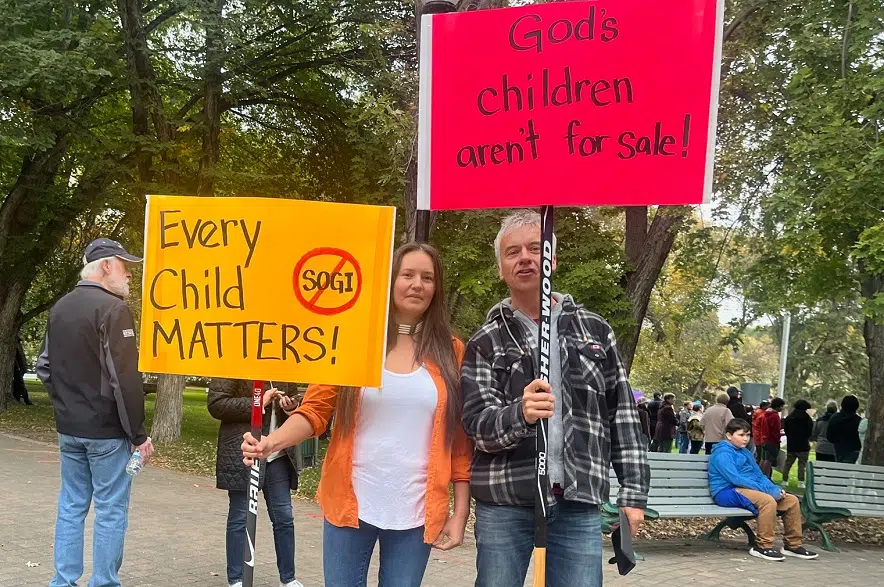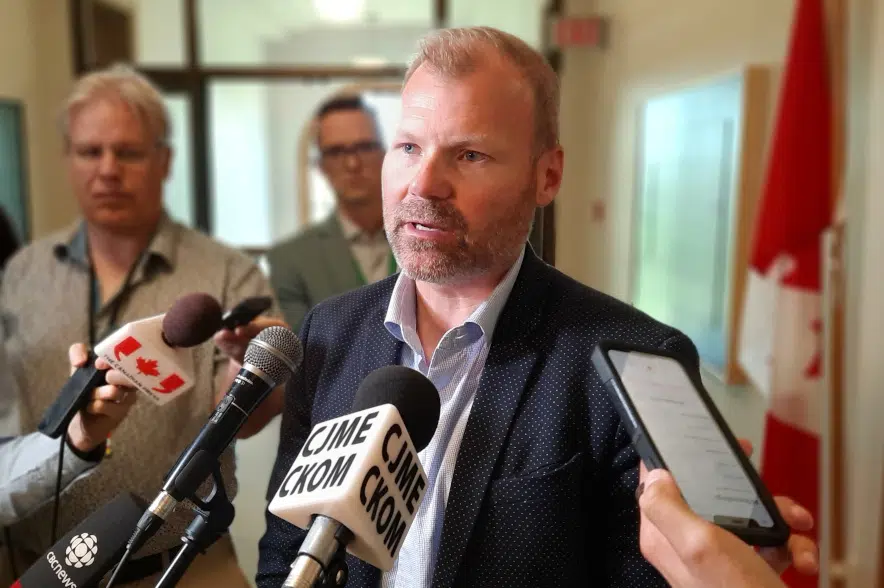During Canada-wide demonstrations on Wednesday calling for more parental involvement in education, one name appeared on a large number of protest signs: ‘SOGI 1 2 3.’
Many demonstrators objected to the program’s inclusion in Canadian classrooms, and called for it to be banned. In Saskatchewan, that program and the foundation that administers it were singled out in the recent suite of education policy changes announced by the provincial government.
The government’s policy changes required school boards to “immediately pause involvement” with third-party groups connected to sexual health education “as the ministry undertakes a review of educational resources to ensure alignment with curriculum outcomes.”
Two third-party groups were specifically named in the government’s statement: The Vancouver-based ARC Foundation and its ‘SOGI 1 2 3’ program.
Then-education minister Dustin Duncan said that program is inconsistent with the government’s policy changes.
“Rather than continuing to have school divisions go forward with an organization that is putting forward policies that are inconsistent with the government, we’re going to pause that work while we work with school divisions to make Saskatchewan policy without a B.C.-based organization,” said Duncan, who was replaced as education minister by Jeremy Cockrill in the latest cabinet shuffle.
So what is ‘SOGI 1 2 3′ anyway?
According to its website, the ARC Foundation “creates and co-funds breakthrough collaboration models for reducing 2SLGBTQ+ discrimination in schools.
“ARC’s primary program is SOGI 1 2 3 which helps educators make schools inclusive and safe for students of all sexual orientations and gender identities through policies and procedures, guidance on creating inclusive environments and teaching resources.”
According to the SOGI website, the name stands for “sexual orientation and gender identity,” and the program is intended to “help educators make schools more inclusive and safe for students of all sexual orientations and gender identities” by providing educational resources to teachers on the topics of gender and sexual orientation.
The program doesn’t have a set curriculum, the website explains, and simply connects educators with resources on the topics.
“Educators have expressed a need for more (gender and sexual orientation) resources and training to ensure all students feel confident being themselves. SOGI 1 2 3 is simply one more way that educators can find the resources they need and learn from each other,” the website reads.
The program’s website also notes: “At a SOGI-inclusive school, students’ gender does not limit their interests and opportunities, and their sexual orientation and how they understand and express their gender are welcomed without discrimination.”
The issue of gender identity and expression may be the reason the program is considered “inconsistent” with the new policy changes in Saskatchewan, as the province’s new rules say parents must be contacted and give approval in cases where young students wish to change the name or pronouns used in school.
That policy change in particular has been described as discriminatory by Dr. Lisa Broda, Saskatchewan’s Advocate for Children & Youth.
Despite the program now being banned in Saskatchewan, Duncan said schools in the province will continue to foster an inclusive atmosphere for all students, regardless of their individual identities.
“Schools will continue to ensure safe learning environments where all students feel included, protected and respected,” the former education minister said.
While some have celebrated SOGI 1 2 3’s removal from Saskatchewan classrooms, others are calling for the changes to be reversed. Large rallies held in support of the new education policies were met with equally large counterprotests at several locations around Saskatchewan earlier this week.
–With files from 650 CKOM’s Lara Fominoff and 980 CJME’s Lisa Schick.












